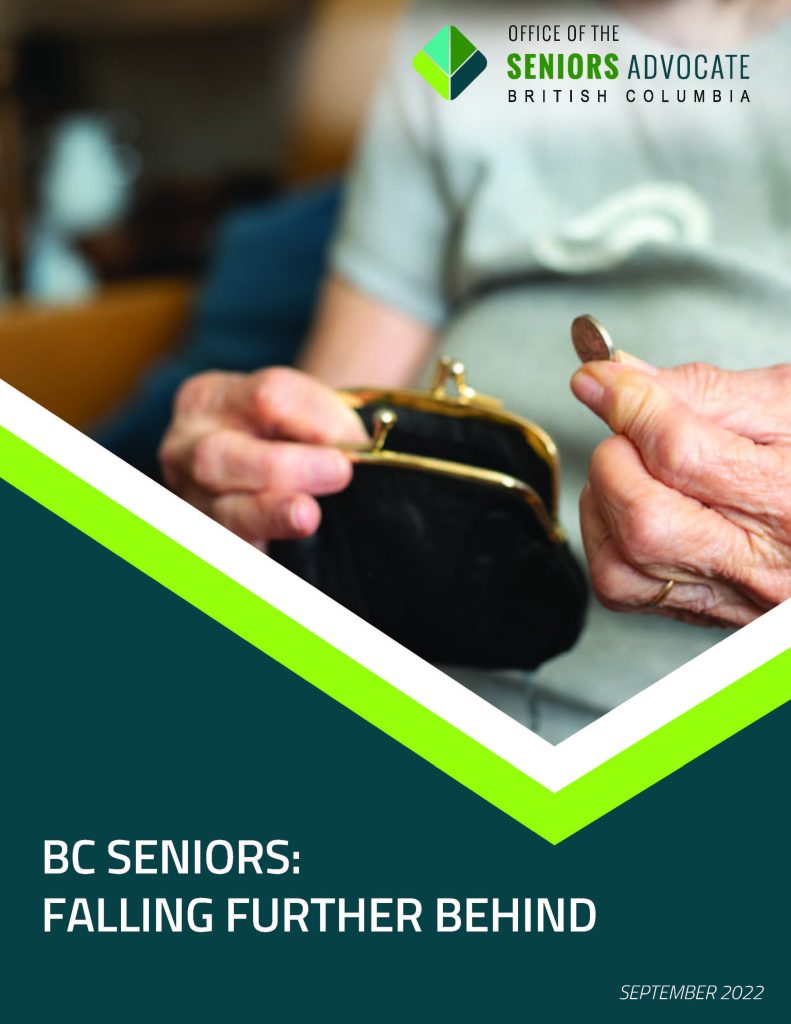In this report, Seniors Advocate Isobel Mackenzie details the results of a systemic review of the impact of rising costs on B.C. seniors who depend on government pensions and ranks B.C. as the lowest in its financial support for seniors compared to other provinces and territories. The report examines the incomes and expenses of seniors across a broad socio-economic landscape and assesses the effectiveness of government supports, services and subsidies. The report includes findings from a spring 2022 survey of low-income seniors and a consultation with 82 community agencies.
Highlights:
- The 2019 median income for B.C. seniors was $30,750 a year, compared to $51,170 for the prime working age population and 25% of seniors earn an income less than $21,000.
- 90% of seniors receive pension income from Old Age Security (OAS) and Canada Pension Plan (CPP) and 28% receive the Guaranteed Income Supplement (GIS) top up for low-income seniors. On average, these pensions provide an annual income of $22,649
- BC Seniors Supplement, a financial support provided by the Province for the lowest income seniors was doubled last year to a maximum of $99 per month but is the fourth lowest in the country and not indexed to inflation.
- In the last 10 years, market rents have increased by 50%, the allowable rent increase jumped 34% while pension incomes have risen just 25%, in the same period.
- The SAFER program is failing in its goal of 30% of income to be spent on rent. Currently, SAFER recipients paying the average rent for a 1 bedroom in Vancouver will spend over 60% of their income on rent and 80% of SAFER recipients have incomes of less than $25,000.
- The wait list for SSH has increased by 50% in the last 5 years and only 8% of applicants on the wait list were placed in a unit last year.
- The average wait time for a SSH unit is three years, with 17% of applicants waiting over five years.
- 49% of low-income senior homeowners report they cannot afford needed major repairs for safety or accessibility.
- An estimated 16% of seniors access the Property Tax Deferral Program
- Seniors with an annual income of $28,000 will be charged $8,800 a year for a 45-minute daily visit of publicly subsidized home support.
- There is no program to fund extended health benefits such as dental, eyeglasses, hearing aids or medical equipment leaving most seniors to pay the total cost.
- 1 in 2 low-income seniors reports they are concerned, or very concerned, about being able to stay in their own home as they age.
- 84% of low-income seniors report running out of money to buy food some of the time.
- There was a 78% increase in use of food banks by B.C. seniors in the last five years.
Recommendations:
- Index the BC Seniors Supplement to inflation consistent with other income supports such as GIS/OAS and CPP.
- Redesign the Shelter Aid for Elderly Renters (SAFER) program to reflect the current reality of the B.C. rental market and ensure yearly rent increases are recognized.
- Increase the number of Seniors Subsidized Housing Units with a particular focus on rural B.C. where the overall supply of rental accommodation for seniors is most challenging.
- Increase awareness of the Property Tax Deferral Program and examine an expansion of the program for low- and modest-income seniors to defer other costs such as strata fees, hydro costs and other municipal charges. Examine how seniors living in co-operative housing might be able to take advantage of the program.
- Develop a program to assist low- and modest-income seniors with major home repairs.
- Eliminate the daily rate for publicly funded home support services.
- Provide an extended health benefit for seniors that includes eyeglasses, hearing aids, mobility aids and necessary medical equipment. The cost of the plan could be covered by premiums based on income, ensuring it is an affordable option for all B.C. seniors.
- Work with the federal government to ensure dental coverage for seniors with co-payments and deductibles based on income or include in an overall extended benefit plan.
- Provide an annual province-wide bus pass for all seniors that includes handyDART. The fee for the pass could be based on a sliding scale matched to income.
- Develop a comprehensive plan to build the capacity of seniors’ centres across B.C. to better support social engagement and help support older people access the supports and services they need to continue to live independently.

